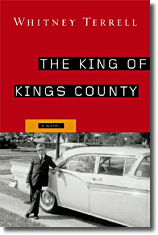 Whitney Terrell is the New Letters Writer in Residence at the University of Missouri-Kansas City. His first novel, The Huntsman (Viking) was a New York Times notable book and was selected as a best book of 2001 by The Kansas City Star and The St. Louis Post-Dispatch. His second novel, The King of Kings County (Viking) won the William Rockhill Nelson award from The Kansas City Star and was selected as a best book of 2005 by the Christian Science Monitor. In 2006, he was named one of 20 “writers to watch” under 40 by members of the National Book Critics Circle.
Whitney Terrell is the New Letters Writer in Residence at the University of Missouri-Kansas City. His first novel, The Huntsman (Viking) was a New York Times notable book and was selected as a best book of 2001 by The Kansas City Star and The St. Louis Post-Dispatch. His second novel, The King of Kings County (Viking) won the William Rockhill Nelson award from The Kansas City Star and was selected as a best book of 2005 by the Christian Science Monitor. In 2006, he was named one of 20 “writers to watch” under 40 by members of the National Book Critics Circle.Terrell applied the "Page 99 Test" to The King of Kings County and reported the following:
Page 99 in The King of Kings County appears during one of the most scatological, curse-ridden, and violent passages in the book. It was also, for these reasons, one of the most enjoyable to write. I like to read it in public. It’s the early 1960s in Kansas City. The narrator, Jack Acheson, is playing in his prep school’s mandatory intramural football league. His team, the Trojans, is composed “of every goof . . . in our entire class.”Visit Whitney Terrell's website to learn more about the author, his novels, and his non-fiction.
Their only decent player is Lonnie Garaciello, also known as the Garbage Man. He’s the class outcast, an Italian in a WASP prep school, and after years of beatings, he has finally outgrown many of his original tormentors -- most of whom are playing on the opposing team, the Crusaders. By page 99, Lonnie has become so intent on revenge that he ignores a handoff and simply rushes through the line to attack his opponents, leaving the quarterback Billy Eckstein and the narrator alone with the ball. They are dogpiled.
“That’s it,” Eckstein said after he and I were finally plucked from the turf at the bottom of the pile. Instead of handing the ball to the referee, he threw it at Lonnie, so that it glanced off his shoulder pads -- his best and longest pass of the year. “I’m sick of you, Garbage. Why don’t you shut up or get off the field.”
Lonnie ignored the ball entirely; it was probably the least painful hit he’d taken all day. Instead he just limped silently back to the huddle, put his hands on his knee pads, and waited for Billy to call the next play.
“He’s right, Garbage,” I said. “You’re out.”
Lonnie spit through the bars of his face mask, a long, viscous string that dangled in the grass between his feet. There was blood in it, I could see.
“Garbage is a faggot,” Freddy said.
“At least I play,” Lonnie said finally. From the creaky way he talked, I guessed he’d had the wind knocked out of him in the pile.
“But you don’t follow the play,” I said. “That’s the whole problem.”
It’s also the problem of the whole book. The King of Kings County’s “adult” plot largely centers on real estate deals, racial covenants, and various illegal and wildly inventive shenanigans that the parents of these children -- especially Jack’s father -- come up with to develop the city. Thanks to these plans, the city is painfully segregated by race and class roles, just like Jack’s prep school. Most of the characters in this scene are unconscious actors, ventriloquists’ dummies in a way, speaking lines, playing roles, and “following the play” that their school and parents have provided for them.
Lonnie is the first of Jack’s friends to understand that following the play might be a bad idea. At the same time, despite his actions, he’s completely aware that not following the play will also be a bad idea -- the definition of a tragic consciousness. And in this scene, he begins to transfer this knowledge to Jack.
--Marshal Zeringue



